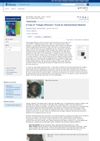November 2022 in “Frontiers in Medicine” Severe hair loss in Chinese men is linked to high blood pressure, while in women, it's linked to larger waist size and cholesterol issues.
 41 citations,
January 2007 in “Journal of Korean Medical Science”
41 citations,
January 2007 in “Journal of Korean Medical Science” Minoxidil and ATRA together boost hair growth more effectively than minoxidil alone.
 37 citations,
April 2013 in “Plastic and Reconstructive Surgery”
37 citations,
April 2013 in “Plastic and Reconstructive Surgery” Genetic and environmental factors, like smoking and exercise, affect male hair loss.
 21 citations,
November 2012 in “Plastic and Reconstructive Surgery”
21 citations,
November 2012 in “Plastic and Reconstructive Surgery” Both genetic and lifestyle factors significantly affect female hair loss.
 18 citations,
March 2016 in “Cosmetics”
18 citations,
March 2016 in “Cosmetics” Telogen Effluvium is a condition causing excessive hair loss due to stress, illness, drugs, or hormonal changes, and can be treated with specific products or naturally resolves after 3-4 years.
 13 citations,
February 1999 in “International Journal of Cosmetic Science”
13 citations,
February 1999 in “International Journal of Cosmetic Science” Hair loss increases between July and October, possibly due to UV light, and factors like skin type, hair color, and density may affect this. Dandruff can worsen hair loss conditions.
 9 citations,
January 2015 in “Skin appendage disorders”
9 citations,
January 2015 in “Skin appendage disorders” The article suggests that the belief in common postpartum hair loss lacks sufficient evidence and may be overestimated.
 March 2024 in “Homoeopathic links”
March 2024 in “Homoeopathic links” Individualized homeopathic treatment led to complete hair regrowth in a patient with stress-induced hair loss.
 December 2023 in “Journal of Cosmetic Dermatology”
December 2023 in “Journal of Cosmetic Dermatology” The hair growth product was effective and safe, increasing hair growth, thickness, and density while reducing hair fall.
 October 2022 in “Research, Society and Development”
October 2022 in “Research, Society and Development” Hair loss is a symptom of long COVID and can be treated with a protein-rich diet.
 April 2022 in “Jurnal Ilmiah Kesehatan Media Husada”
April 2022 in “Jurnal Ilmiah Kesehatan Media Husada” Telogen effluvium is a common, reversible hair loss condition treatable with patient education and sometimes Minoxidil.
 November 2021 in “CRC Press eBooks”
November 2021 in “CRC Press eBooks” Telogen effluvium is a common, temporary hair loss condition often affecting young women.
 March 2021 in “Actas Dermo-Sifiliográficas”
March 2021 in “Actas Dermo-Sifiliográficas” The microbiome may be linked to hair loss and could be a target for new treatments.
August 2018 in “Ayurline: IJ-RIM” Diet and lifestyle changes can help manage hair loss in alopecia.
 January 2018 in “Springer eBooks”
January 2018 in “Springer eBooks” Telogen Effluvium causes more hair loss because hair moves to the resting phase too soon.
 November 2014 in “British Journal of Dermatology”
November 2014 in “British Journal of Dermatology” Male hair loss is mainly due to thinner hair, not less hair.
 214 citations,
March 1993 in “Archives of Dermatology”
214 citations,
March 1993 in “Archives of Dermatology” Telogen effluvium is a reversible hair loss condition that requires a detailed diagnosis and often resolves on its own.
 129 citations,
January 2009 in “International Journal of Trichology”
129 citations,
January 2009 in “International Journal of Trichology” Trichoscopy can diagnose female hair loss with high accuracy by looking for specific patterns in hair and scalp appearance.
 128 citations,
October 2011 in “Development”
128 citations,
October 2011 in “Development” Activating a protein called β-catenin in adult skin can make it behave like young skin, potentially helping with skin aging and hair loss.
 36 citations,
June 2009 in “Nanomedicine”
36 citations,
June 2009 in “Nanomedicine” Fullerene nanomaterials help hair grow faster and increase hair follicles.
 32 citations,
April 2015 in “British Journal of Dermatology”
32 citations,
April 2015 in “British Journal of Dermatology” The hair shedding scale accurately identifies abnormal hair shedding in women with long hair, with grades 5 and 6 indicating excessive shedding.
 17 citations,
April 2016 in “Journal of Investigative Dermatology”
17 citations,
April 2016 in “Journal of Investigative Dermatology” KB2115 (eprotirome) can safely extend the hair growth phase without damaging cells or changing hair color.
12 citations,
January 2022 in “Cells” Dermal papilla cell vesicles can boost hair growth genes in fat stem cells.
 11 citations,
July 2020 in “Journal of Cosmetic Dermatology”
11 citations,
July 2020 in “Journal of Cosmetic Dermatology” Sandalore® improves hair growth and quality in people with hair loss.
 9 citations,
April 2019 in “Biomolecules & Therapeutics”
9 citations,
April 2019 in “Biomolecules & Therapeutics” Udenafil may help hair grow by activating certain stem cells.
7 citations,
February 2017 in “The American journal of medicine” People often have iron deficiency after weight-loss surgery, which can cause symptoms like hair loss and dizziness, and iron levels should be tested to diagnose it.
 7 citations,
April 2013 in “Clinical and Experimental Dermatology”
7 citations,
April 2013 in “Clinical and Experimental Dermatology” Tianeptine, an antidepressant, may prevent stress-induced hair loss in mice.
 6 citations,
March 2018 in “Journal of Medicinal Food”
6 citations,
March 2018 in “Journal of Medicinal Food” Chicken egg yolk peptides can promote hair growth by increasing a specific growth factor.
 6 citations,
November 2017 in “Skin appendage disorders”
6 citations,
November 2017 in “Skin appendage disorders” Topical botanical lotion increases hair density and improves quality of life in women with hair loss.
 5 citations,
May 2008 in “Nature Precedings”
5 citations,
May 2008 in “Nature Precedings” Trichoscopy is a useful non-invasive method to diagnose female hair loss with high accuracy.

























